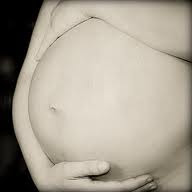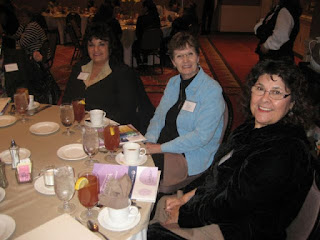 Last night as I was laying in bed the number 40 struck me. As many people know women are pregnant for 40 weeks. In the Bible the number 40 is repeated several times; it rained 40 days and 40 nights when God wanted to cleanse the world and start over (Gen. 7:13), the Israelites spent 40 years in the wilderness (Ex. 16:35), Jesus fasted for 40 days in the wilderness before starting his public ministry (Matt. 4:1-2), and Jesus' ascension to heaven occurs 40 days after the Resurrection (Acts 1:3). These are only some of the examples in the Bible where the number 40 is referred to. While our Catholic faith teaches us that numbers in the Bible should not be taken literally but symbolically, it's an interesting comparison, for me, that the number 40 in the Bible could have some connection to the number of weeks a woman is pregnant.
Last night as I was laying in bed the number 40 struck me. As many people know women are pregnant for 40 weeks. In the Bible the number 40 is repeated several times; it rained 40 days and 40 nights when God wanted to cleanse the world and start over (Gen. 7:13), the Israelites spent 40 years in the wilderness (Ex. 16:35), Jesus fasted for 40 days in the wilderness before starting his public ministry (Matt. 4:1-2), and Jesus' ascension to heaven occurs 40 days after the Resurrection (Acts 1:3). These are only some of the examples in the Bible where the number 40 is referred to. While our Catholic faith teaches us that numbers in the Bible should not be taken literally but symbolically, it's an interesting comparison, for me, that the number 40 in the Bible could have some connection to the number of weeks a woman is pregnant. In the Bible the number 40 denotes a time period when God made major changes so that transformation could occur. Usually it's a time period of testing, probation or trial in preparation for a period of restoration, revival, or renewal; essentially the 40 days/weeks/years is a period of time in preparation for a special action of God. For a pregnant women, naturally, the special action of God is the birth of a new life, a creation of God. In my opinion, the time period which the number 40 denotes, while can be perceived and feel like a time of trial and tribulation, is a time of grace. It is a time of grace because we are able to reflect upon our lives as God's beloved and we are given the opportunity to change our ways so that who we are as God's beloved can more clearly be reflected in our actions, hearts, and words. Those 40 days/weeks/years prepare us to see and feel God more "nearly, clearly, and dearly" (St. Ignatius, Godspell, and Richard of Chichester in the 1200s).
As we approach Lent, a period of 40 days, we are to recall the traditional pillars of Lent: prayer, fasting, and almsgiving. These pillars, if practiced, renew our baptismal promises, bring us closer to Christ, and help us to grow into the people that God called us to become. The number one way to get closer to God is to pray. If we cut off our communication with God and we don't pray there cannot be a two-way relationship. During this season it is of utmost importance that prayer is central. Fasting is a practice of self-discipline and self-control. It is often an aid to prayer, in that pangs of hunger help us to recall our pangs for God. The fasting that we observe during Lent should call us towards transformation. If we fast, merely because we have to, and the fasting does not cause any internal or external changes in our lives, then this is not the type of fast that God is asking of us. Fasting also helps us to recall those in our world who do not have food at their tables. It brings us closer in solidarity with them. Almsgiving, in the form of money and/or time, is a sign of our care for those who are in need. It is also an expression of thanks to God for all that we have been given in our lives. As we all know, Lent is a time of preparation for Jesus' resurrection. If we are proactive in our faith lives, these forty days can be very grace-filled. Ultimately, this preparation helps us to become more present and alert to God and Easter when it comes.
What about the 40 weeks of pregnancy? The connections one can draw between the Biblical notion of 40 and the 40 weeks of pregnancy are many. Pregnancy is a time of trial in that your body is pushed to many limits, one gets little sleep, feels nauseated, swollen, bigger in size, has less energy, gets leg cramps, has bloody noses...and the list goes on. Beyond the physical aliments there are also the emotional and spiritual struggles one experiences: Am I ready to be a mother? Why is God asking me to be a mother now? How am I going to raise a good Catholic child in a world that is full of evil and sin? Yet, while all of this is going on during these 40 weeks my husband and I are preparing for what is to come (similar to Lent). We are preparing by asking God daily for the grace and the strength to be good parents, researching what we can in preparation for her arrival, and setting up a home where she can grow and mature into the wonderful young woman we hope she becomes. These 32 weeks and 6 days, while there have been some challenges, have been so grace-filled. This time period has brought me closer to God, my husband, my family, friends, community, and myself. I enjoy every movement I feel within me. Each kick is a sign of health and vitality. Every ultrasound has brought me either to tears or close to tears in recognition of the grace of God's creation within me. God is very present and it is awesome to know that this child within me is also God's beloved.
In some sense prayer, fasting, and almsgiving, for me, started to occur more intensely the day I found out I was pregnant. I began to pray for God's graces during and after the pregnancy. I began fasting from coffee, certain cheeses, deli meat, other foods, and other things such as my more intense workout schedule (due to my body being so tired). And I am giving of my time, all of the time, to a life, within me, that is in need of nourishment and love. I have also grown even more passionate about the anti-abortion movement. I have always truly believed that life begins the moment the egg and sperm meet. After seeing my first ultrasound I feel that every woman who is about to have an abortion should be required to see the life that is within her in an ultrasound before any procedure takes place. After seeing their child I bet their minds and hearts will be challenged. Our first ultrasound was at 12 weeks...and our little Sofia was fully formed...arms, legs, head...everything! My husband and I heard her heartbeat and we both cried. Anyway, in the sense of almsgiving, I know that this period of pregnancy has brought me closer to those who are vulnerable, the unborn.
I think our mindset has a lot to do with the way one experiences pregnancy and Lent. I have chosen to relish these 40 weeks of pregnancy as a time period that is grace-filled. I have chosen to enjoy this pregnancy, at every stage, no matter how challenging it may seem to be. How often in one's life is one pregnant? How often in one's life does one feel the pitter patter of little feet tapping the inside of one's belly? How blessed are Mike and I, that we are fertile and we can have children? We are abundantly blessed and even though pregnancy is not easy it is a time of relishing God within and around.
As can be sensed from what I have written, Lent is a period of time that, in my opinion, is very similar to pregnancy. One can dread Lent as a time of mourning, pain, and giving things up. However for me Lent is one of my favorite liturgical seasons, in that it is a time that God has given us to grow closer to God while also growing closer to whom God has called us to become. Lent is a time of preparation and anticipation, struggle and grace. As the season of Lent approaches, Wed. March 9th, how will you prepare for Easter? How will you use the opportunity God has given you, during the season of Lent, to grow closer to God?










